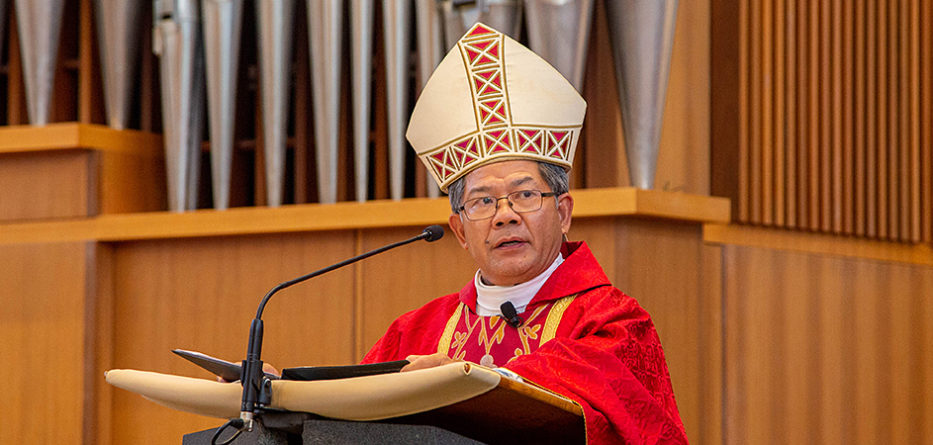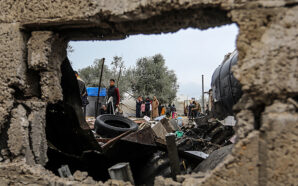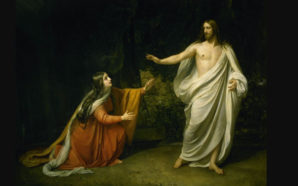Most Reverend Vincent Long Van Nguyen OFM Conv DD STL, Bishop of Parramatta
Homily for the Votive Mass of the Holy Spirit celebrating the commencement of the law term (Red Mass) at St Patrick’s Cathedral, Parramatta.
Readings: Isaiah 42:1-3; Luke 4:16-22
Dear friends,
Last week, Australia mourned the passing of Sr Janet Mead whose rather unconventional rendition of the “Lord’s Prayer” made her an unlikely global celebrity. Inspired by the Second Vatican Council, she took the Gospel to the young and made religious experience accessible to them. It was symptomatic of her radical openness to the call of the spirit. This openness led her to the poor, refugees, indigenous and those who are on the margins and shadows of society. Despite the acclaim, Janet turned her attention to what mattered to her most: championing the rights of the down and out. She left us a proud legacy and challenged us to be a vehicle of the Good News.
The scriptures for this Red Mass offer us a similar challenge. They bear witness to the fact that God identifies with the weak and the powerless. In Jesus, their rights become the object of God’s concern and action in the world. We are challenged to respond to the cry of the poor and to commit ourselves to work towards God’s vision of justice, mercy and the fullness of life for all humanity.
In the Old Testament reading, we heard the first of the four Servant Songs in Isaiah. They describe the attributes of the King Messiah or the Righteous Servant of God and how he would minister to the suffering people. The Servant is described as God’s agent of justice. “Faithfully, he will bring forth justice to the nations.” He will do so not by force but by tenderness, not by destroying but by healing. “A bruised reed he will not break, and a dimly burning wick he will not quench”. These images can be understood as metaphors for the pain and suffering endured by the Jewish exiles. Thus, the mission of the Servant Messiah is bound up with delivering justice, dignity and liberation to the victims of injustice, conquest and oppression.
The Gospel tells us the story of the beginning of Jesus’ public ministry. “The spirit of God has anointed me. He sent me to bring the Good News to the poor, liberty to captives, sight to the blind and the Year of favour for all”. With these words, Jesus set out his mission. They sum up those things that Jesus would later do in respect of the social outcasts. They encapsulate his attitude, his vision and his mission. The God of Jesus was not confined to a tribe, a country, a social status. He embodied and preached a God that transcended the established walls that separate, the rules that categorise and label people, and the borders that define party loyalty. The pain and hurt of poverty, captivity, blindness, and oppression know no boundaries. That means the divine favour of good news, release, sight, and freedom can have no boundaries either.
Brothers and sisters,
There is no other field of human endeavour that is so deeply connected to justice as the legal profession. As Christians, your mission reflects that of the Servant Messiah who delivers justice, dignity and liberation to the victims of injustice. Modelled on Jesus, the great liberator, you are to lead others, especially the unjustly oppressed to higher levels of inclusion and human flourishing.
Ever since Pope Francis unexpectedly came onto the scene, he has challenged us to reclaim the liberating message of the Gospel. For him, it has little to do with maintaining the status quo, especially when that status quo is less than what God wants for us as individuals and as a community. Australia is a great country but where it is in terms of its treatment of asylum seekers, the indigenous and marginalised people, we have some work to do still. 50 years ago, Martin Luther King Jr lamented that the Christian churches were largely adjusted to the status quo, standing as a tail-light behind other community agencies rather than a headlight leading people to higher levels of justice.
We find an echo of King’s prophetic stance in Pope Francis’ Joy of the Gospel. “I prefer a church which is bruised, hurting and dirty because it has been out on the streets (with the poor), rather than a church which is unhealthy from clinging to its own security”. We cannot be true to the Gospel if we safeguard our privileges and fail to deliver justice and human dignity to those who are unjustly deprived of it. It is God’s vision of justice, mercy and the fullness of life for all that consumes us and spurs us on.
It has never been so tough to be a Catholic. But then, we need to remember that the tough times can be the blessed times. The church was not at its best when it reached the heights of imperial power in what was known as Christendom. The church was at its best when it was poor, persecuted, without power and wealth. Consistently, we true believers are challenged to be the beacons of hope in the midst of pain, suffering and despair. This tough time can be the catalyst for rebirth and transformation.
As we pray for the guidance of the Holy Spirit on our work at this Red Mass, we recommit ourselves towards God’s vision of justice, mercy and the fullness of life for all humanity. Let God’s total self-emptying in Christ and his audacious identification with the victims of injustice be our inspiration. Then we can truly be the servants of justice, the conduit of mercy and the sign of hope for all.








